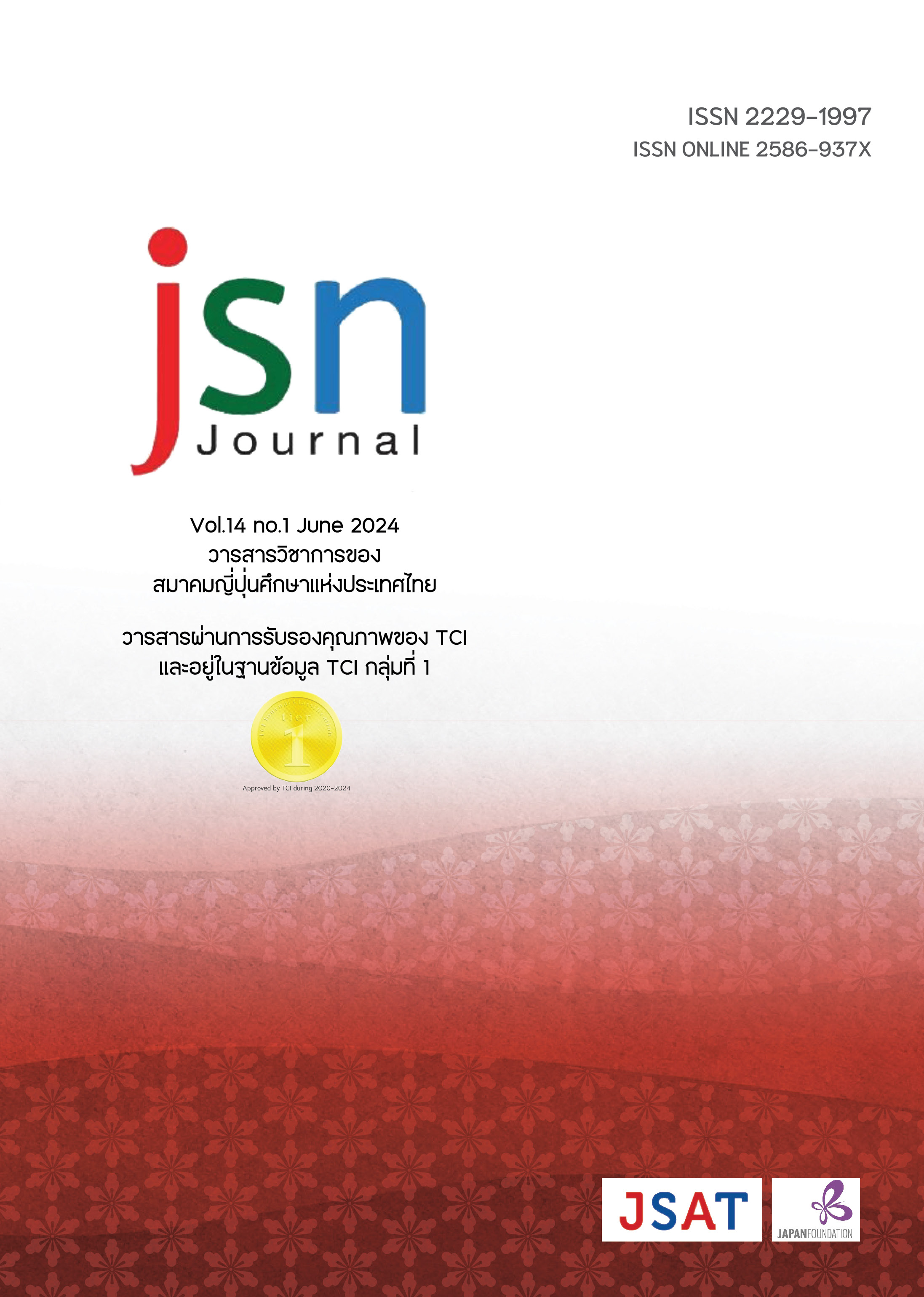The Situational Factors That Affect the Language Used in Offering Assistance Among Thai, Japanese and Thai Japanese Language users
Main Article Content
Abstract
This research article is a study of the language used in offering assistance on the part of Thai, Japanese and Thai Japanese language users. The objective was to study the semantic units used in offering assistance and to study the relationships among the situational factors and types of semantic units. Data were collected through a discourse completion test from a sample of Thai, Japanese and Thai Japanese language users, with a total of 180 people. Data were analyzed by counting frequencies and using percentage statistics. The study found the following. One, the semantic units used in offering assistance can be divided into three groups: introductory utterances, offer-assistance utterances, and supplementary utterances. Two, the type of situation affected the selection of the type of semantic units, and three, situational factors affected Thais in choosing the type of semantic units---in situations that provide assistance in personal matters, Thais asked the interlocutor for information in the introduction, offered assistance by asking about the interlocutor’s needs, and often used supplementary semantic units. In the situations that provide assistance in work, Thais used identity markers in the introduction, offered assistance by asking non-specific questions and not using supplementary semantic units. Four, situational factors affected the Japanese in choosing the type of semantic units in introductory utterances and supplementary utterances, but did not affect offer-assistance utterances---in situations that provide assistance in personal matters, the Japanese asked the interlocutor for information in the introduction while they mentioned the interlocutor's condition in situations that provide assistance in work and often used supplementary semantic units, and offered assistance in the form of questions in every situation. Five, situational factors affected the Thai Japanese language users in choosing the type of semantic units in introductory utterances and supplementary utterances, but did not affect offer-assistance utterances---in the situations that provide assistance in personal matters, Thai Japanese language users asked the interlocutor for information in the introduction while they used identity markers in the situation that provide assistance in work, and offered assistance in the form of questions in every situation.
Article Details

This work is licensed under a Creative Commons Attribution-NonCommercial-NoDerivatives 4.0 International License.
ข้อความและข้อคิดเห็นต่างๆ ในบทความเป็นของผู้เขียนบทความนั้นๆ ไม่ใช่ความเห็นของกองบรรณาธิการหรือของวารสาร jsn Journal
References
พรเทพ แก้วเชื้อ. (2560). พฤติกรรมการเป็นสมาชิกที่ดีขององค์การในประเทศไทย. วารสารวิชาการมหาวิทยาลัยปทุมธานี, 9(1), 210-217.
Brown, P.,& Levinson, S. (1994). Politeness : Some universals In Language Usage. Cambridge University Press.
Lakoff, R. (1973). The logic of politeness: or minding your p’s and q’s. Chicago Linguistics Society 8, 252-305.
Leech, G. (1983). Principles of Pragmatics. Longman.
キィ・ティダー (2002).「ビルマ語と日本語における申し出表現-申し出の仕方を中心に-」『世界日本語教育12』,145-162.
坂本恵・蒲谷宏 (1995).「「申し出」表現について」『国語学研究と資料』19, 25-35.
デウイ・クスリニ (2014).「日本語母語話者の「申し出」表現の選択要因:行動の授助を提供する場面における救急度」『言語文化学研究 言語情報編 9』大阪府立大学学術情報リポジトリ, 101-122.
峯崎知子 (2012).「日本語の申し出場面における言語行動–申し出の相手と場面による配慮の表し方 を中心に–」https://www.earticle.net/Article/A280531,185-204.
ラッタナブリー・ナンティヤー(2015).「申し出行為の特徴―タイ人と日本人の比較を中心に―」『接触場面における言語使用と言語態度 接触場面の言語管理研究』12, 97-108.
楊吟 (2013).「申し出表現の形式:日本語・中国語・英語・韓国語の対照研究」『國文論叢』46, 48-64.


